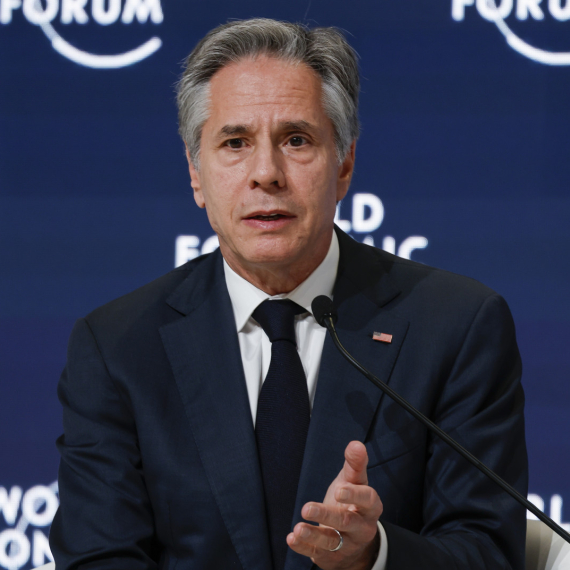CERN director general visits Serbia
CERN Director General Rolf-Dieter Heuer is in Serbia today, where he is meeting with top officials and touring educational and scientific institutions.
Wednesday, 28.03.2012.
15:28

CERN Director General Rolf-Dieter Heuer is in Serbia today, where he is meeting with top officials and touring educational and scientific institutions. The head of the European Organization for Nuclear Research (CERN) met with Serbian President Boris Tadic, and later in the day with Serbian Minister of Education Zarko Obradovic, when they visited to the Belgrade Faculty of Physics. CERN director general visits Serbia Hauer noted that that scientists constitute Serbia's major potential regardless of the lack of more advanced equipment, and added that Serbia would have great benefits from accessing the organization. Serbia joined the scientific organization as associate member earlier this year. A total of 15 scientists from Serbia are currently cooperating with CERN, and the number should increase, Heuer said and added that Serbia promptly ratified the agreement thus becoming an associate member, which opened more room for cooperation. He expressed belief that scientists constitute Serbia's major potential. Heuer hopes that considerable progress would soon be made on the most intriguing project conducted by CERN, that is, the discovery of the Higgs boson. Obradovic noted that Serbia has many benefits from CERN accession and that the cooperation is not exclusively bound to physicists. We will organize a meeting and see whether businessmen can join in as well, and there is a possibility for CERN research to be used in medicine too, which means that the contribution is not resorted to the field of physics alone, Obradovic said. He added that CERN officials were surprised by the prompt ratification of the agreement which made Serbia an associate member of CERN. Although Serbian scientists are working here on equipment which is not the as advanced as it could be, their presence in CERN projects testifies of their quality, Obradovic concluded. Heuer visited Serbia for the second time on Wednesday and told the Politika daily in an interview that physicists from the University of Belgrade, Nuclear Science Institute in Vinca and Physics Institute were participating successfully in experiments on the Large Hadron Collider. Since this installation is providing huge quantities of good experimental data, Serbian physicists and their colleagues from Europe and the rest of the world are on the front lines of research into nature's greatest secrets, Heuer stated. As a member of CERN, Serbia will be able to take advantage of all these benefits and participate equally with other CERN members in creating the European policy and strategy for the development of particle physics, he noted. CERN is pleased to welcome Serbia and looks forward to its return to the CERN family, he remarked, adding that he hoped Serbia's entire population, along with its scientists, universities and industry will benefit from the membership. Together with its developed technologies and know-how that has been implemented in medicine, engineering and information technology, CERN has an important role in preparing scientists, engineers and inventors of various profiles for the future, Heuer stated. CERN has developed a whole range of education programs, starting from informal education for the youngest students to specialized physics courses for students of secondary schools, as well as programs in information and accelerator technologies for college students and professionals, he said. Serbian President Boris Tadic and CERN Director General Rolf-Dieter Heuer signed an agreement in Geneva on January 10, by which the conditions for Serbia's associate membership in the organization were fulfilled. During the latest sitting, the parliament ratified the agreement thus making Serbia an associate member and the decision on full membership can be adopted after a maximum of five years. As one of former Yugoslav republics, Serbia was one of CERN founding countries in 1954, but ceased to be a member of the organization in 1961. CERN is the world's largest laboratory for particle physics and main research are conducted in the Large Hadron Collider during which scientists are trying to discover the Higgs boson, also known as "the God particle". Heuer and Tadic in Belgrade today (Tanjug) Politika Tanjug
CERN director general visits Serbia
Hauer noted that that scientists constitute Serbia's major potential regardless of the lack of more advanced equipment, and added that Serbia would have great benefits from accessing the organization.Serbia joined the scientific organization as associate member earlier this year.
A total of 15 scientists from Serbia are currently cooperating with CERN, and the number should increase, Heuer said and added that Serbia promptly ratified the agreement thus becoming an associate member, which opened more room for cooperation. He expressed belief that scientists constitute Serbia's major potential.
Heuer hopes that considerable progress would soon be made on the most intriguing project conducted by CERN, that is, the discovery of the Higgs boson.
Obradović noted that Serbia has many benefits from CERN accession and that the cooperation is not exclusively bound to physicists.
We will organize a meeting and see whether businessmen can join in as well, and there is a possibility for CERN research to be used in medicine too, which means that the contribution is not resorted to the field of physics alone, Obradović said.
He added that CERN officials were surprised by the prompt ratification of the agreement which made Serbia an associate member of CERN.
Although Serbian scientists are working here on equipment which is not the as advanced as it could be, their presence in CERN projects testifies of their quality, Obradović concluded.
Heuer visited Serbia for the second time on Wednesday and told the Politika daily in an interview that physicists from the University of Belgrade, Nuclear Science Institute in Vinča and Physics Institute were participating successfully in experiments on the Large Hadron Collider.
Since this installation is providing huge quantities of good experimental data, Serbian physicists and their colleagues from Europe and the rest of the world are on the front lines of research into nature's greatest secrets, Heuer stated.
As a member of CERN, Serbia will be able to take advantage of all these benefits and participate equally with other CERN members in creating the European policy and strategy for the development of particle physics, he noted.
CERN is pleased to welcome Serbia and looks forward to its return to the CERN family, he remarked, adding that he hoped Serbia's entire population, along with its scientists, universities and industry will benefit from the membership.
Together with its developed technologies and know-how that has been implemented in medicine, engineering and information technology, CERN has an important role in preparing scientists, engineers and inventors of various profiles for the future, Heuer stated.
CERN has developed a whole range of education programs, starting from informal education for the youngest students to specialized physics courses for students of secondary schools, as well as programs in information and accelerator technologies for college students and professionals, he said.
Serbian President Boris Tadić and CERN Director General Rolf-Dieter Heuer signed an agreement in Geneva on January 10, by which the conditions for Serbia's associate membership in the organization were fulfilled.
During the latest sitting, the parliament ratified the agreement thus making Serbia an associate member and the decision on full membership can be adopted after a maximum of five years.
As one of former Yugoslav republics, Serbia was one of CERN founding countries in 1954, but ceased to be a member of the organization in 1961.
CERN is the world's largest laboratory for particle physics and main research are conducted in the Large Hadron Collider during which scientists are trying to discover the Higgs boson, also known as "the God particle".

























































Komentari 0